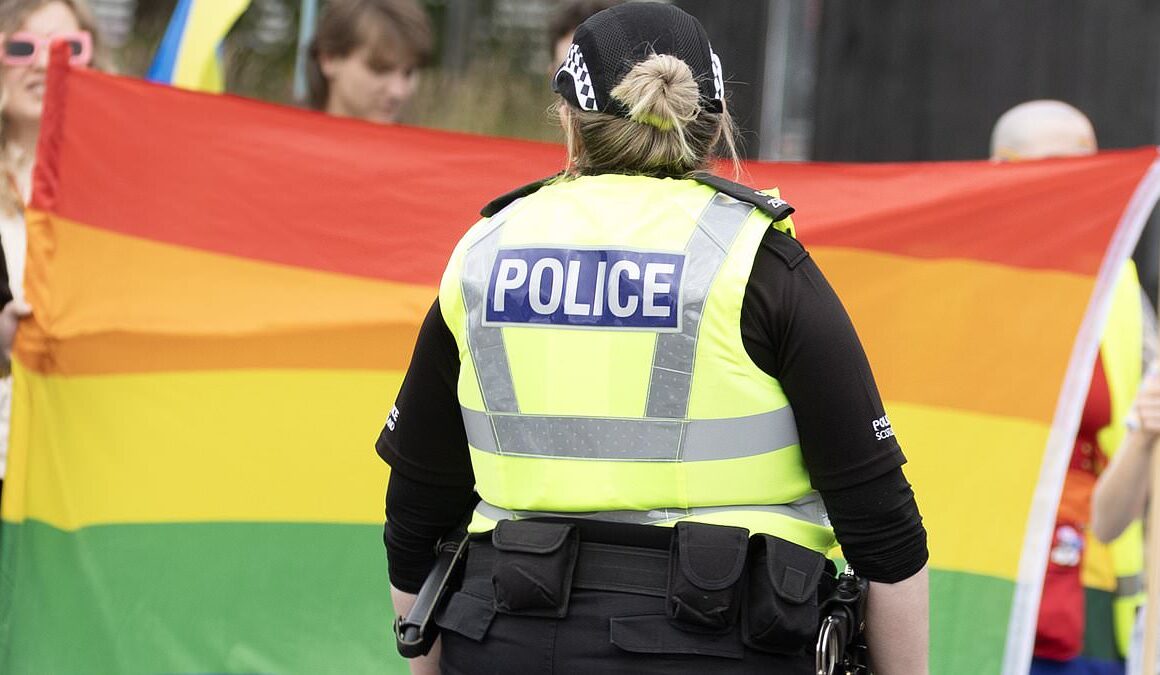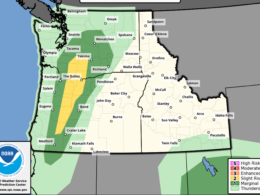It should come as no surprise that crime increases when the number of police officers is cut – for proof, just take a look around.
Scotland’s biggest city has descended into something approaching squalor – and anti-social behaviour is endemic.
Drug sales and abuse in the street are fuelled by police inaction – meaningless warnings are now dished out even for heroin possession.
Then there’s the public urination, in broad daylight, and loud, disruptive groups of addicts and drinkers congregating amid the litter and discarded syringes.
Graffiti covers almost every inch of the city, or large swathes of it, and the council fights a losing battle to get rid of it – though sometimes it doesn’t, or says it can’t.

Crime is increasing as the number of Police Scotland officers dwindles
One disused building on the main shopping street in Shawlands, in the South Side, is covered in vile anti-police daubings – and has been for several months.
Yet the council insists it cannot intervene as it’s privately owned, and the police have a policy of refusing to take forward reports of ‘minor’ crime for full investigation – so it’s not worth raising with the force, even though it’s the target of the abusive slogans.
‘Legal graffiti walls’ are now being set up as an outlet for frustrated ‘street artists’ – but there can’t be many of them around, given that most of the city is already covered in their ‘artistry’; how much more of an outlet do they need?
Glasgow is hardly alone – these problems are common to towns and cities across Scotland, where high streets have struggled to recover after the ravages of the Covid pandemic – when home working became the norm, hitting footfall and hollowing out urban centres.
Beat bobbies are nowhere to be seen and leaders of the rank-and-file tell us foot patrols are a thing of the past.
The overall number of crimes has risen by 4 per cent from 289,362 to 299,780 between 2022-23 and 2023-24, with a violent or sexual offence logged every six minutes on average.
One housebreaking is reported every hour, and shoplifting – which appears to have been more or less decriminalised – has risen to its highest level in the past ten years.
When their heads aren’t firmly buried in the sand, ministers insist most of us don’t experience crime – but of course it depends how that’s defined.
If you have to navigate past brawling drunks and addicts openly injecting in the streets during your lunch break, or see public buildings vandalised while you’re on your way to work – with the authorities claiming to be powerless to act – then have you experienced crime?
It is clear that you have, yet this kind of attritional lower-level offending doesn’t register with our political masters, who tell us Scotland is safer under the SNP.
Last year the Scottish Government’s own research showed record levels of violent crime, theft and vandalism are not being reported because the public have no confidence the police will respond.

Police Scotland has been criticised for encouraging officers to attend Pride marches in return for pay or time off
According to the Scottish Crime and Justice Survey, only 39 per cent of those asked said they were aware of regular patrols in their area.
Only 49 per cent of adults believe Police Scotland does a good or excellent job, compared with 61 per cent in 2012-13, the year before the creation of the single force.
The cause of much of this disillusionment is the gradual retreat of police from the communities they are supposed to serve.
Dozens of police stations have been earmarked for closure – and many of those which have survived the cull are falling apart.
One police office building in Glasgow had a re-design costing more than £2million and now boasts taps capable of dispensing sparkling water – but most cops are based in far less salubrious surroundings.
Stations are seen as outmoded, but they are at least physical symbols of a police presence – and, like beat cops, they’re vanishing.
Police numbers are at their lowest level since 2008, which helps to explain the absence of bobbies pounding the pavements.
The force has rolled out a ‘proportionate response’ strategy, which means thousands of ‘minor’ crimes won’t be investigated – beyond a few cursory questions over the phone.
In such cases – for example garden theft – police will only run the rule over the report, probably before breaking the news that there’s nothing they can do (or are willing to do), unless the victim is deemed to be vulnerable.
This has been done in the most shockingly cack-handed manner, and it’s underpinned by threadbare evidence that simply doesn’t stand up to scrutiny.
The reality is that there will be a huge loss of ‘investigative opportunities’, as they’re called – chances to check out reports by sending officers to the address and speaking to neighbours, or looking for CCTV footage.
A ‘crime number’ will be handed out for insurance purposes, but you’re probably on your own – unless you do your own detective work, and even then there’s no guarantee the police will take an interest.
There are other priorities at play – such as wading through more than 10,000 complaints under the SNP’s Hate Crime Act, so far resulting in only a few dozen convictions, as the Mail revealed yesterday.
Then there’s the important business of paying officers to participate in Pride marches, proudly displaying badges issued by the force.
So, if you are looking for your local bobbies, head towards your nearest LGBT rally or procession – there’s a good chance some of them will be taking part.
Meanwhile, ministers turn a blind eye – it suits them for top brass to be driving a ‘proportionate response’ to tackling crime (how many victims agree that it’s ‘proportionate’?), as it gives them cover to keep under-funding the force they created.
If the police can make ends meet with the cash they have, the argument will run, why give them more – and do they really need all those cops anyway; maybe more cuts can be made?
There are plenty of officers risking their lives on a daily basis and they deserve praise for their stamina and dedication – but many of them are clearly burnt-out by the pressures they face.
More than 1,200 officers and staff left the force last year, and a recent police report said only around 950 had been hired to replace them – adding that ‘grievance and absence due to stress… have seen an increase, giving rise to some concern about the wellbeing of the workforce’.
Most officers joined the force to help people and keep the streets safe, largely by catching the bad guys – an increasingly old-fashioned idea among some of the liberal hand-wringers in the Police Scotland hierarchy.
Police bosses and ivory-tower ministers plainly don’t care about the consequences of ceding so much ground to criminals.
They’re turning our national force into a laughing-stock – while the rest of us have to suffer the fallout from a police service on its knees.







